‘Radio Culture’ at TUTA Theatre: Conjuring day in the ‘normal life’ of a young Berlarusian
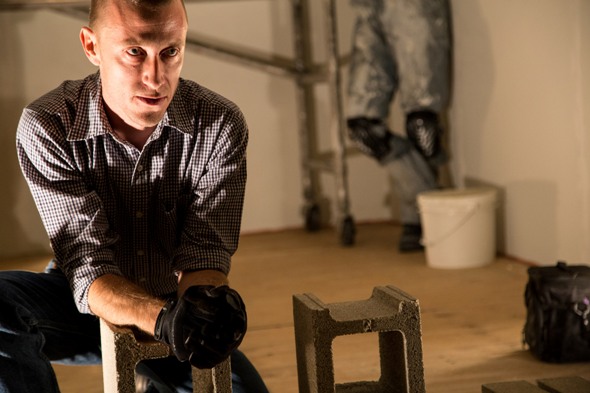
Kevin V. Smith plays Volodya, who just wants a normal life, in the U.S. premiere of ‘Radio Culture,’ a riveting play out of Eastern Europe. (Photos by Austin D. Oie)
Review: “Radio Culture” by Maxim Dosko at the TUTA Theatre Company through Dec. 2. ★★★★
By Hedy Weiss
For more than two decades, TUTA Theatre Company has forged its reputation by introducing audiences to unusual theatrical fare drawn largely from Eastern and Western European playwrights. The company has been more or less itinerant. But for the next month or so, if you venture into its newest, tiny (25-seat) storefront in a hidden corner of the Ravenswood neighborhood, you will spend 70 absolutely riveting minutes experiencing the U.S. premiere of Maxim Dosko’s “Radio Culture.”
The play, newly translated and adapted by Natalya Fedorova and Amber Robinson, ingeniously directed by Robinson, and brilliantly performed by Kevin V. Smith, was the recipient of the “Best Experimental Writing” award in the 2014 International Contest of Contemporary Drama of the fabled Belarus Free Theatre. And if that sounds too distant, esoteric or obviously avant-garde, rest assured that the genius of Dosko’s play is its everyman-like accessibility.
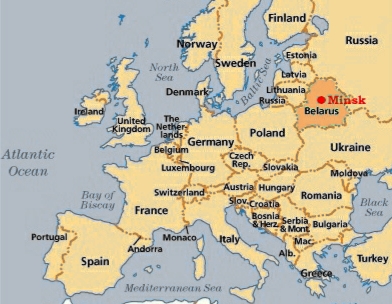 In fact, “Radio Culture” might easily have been subtitled “A day in the life of Volodya, a 30-year old construction foreman.” Volodya works in a small but burgeoning town outside Minsk, the capital of Belarus – a country that declared its independence from the Soviet Union in 1991, but since 1994 has been led by Alexander Lukashenko, often referred to as “Europe’s last dictator” (even if he has considerable competition for that title these days).
In fact, “Radio Culture” might easily have been subtitled “A day in the life of Volodya, a 30-year old construction foreman.” Volodya works in a small but burgeoning town outside Minsk, the capital of Belarus – a country that declared its independence from the Soviet Union in 1991, but since 1994 has been led by Alexander Lukashenko, often referred to as “Europe’s last dictator” (even if he has considerable competition for that title these days).
Intelligent, hard-working, intensely stressed and painfully aware of the social, intellectual and financial constrictions of his existence, Volodya lives in a modest apartment in Minsk with his parents and younger sister. He has a car, is more or less a loner, and spends a great deal of time dealing with issues involving his employees, many of whom are “from the provinces” and are housed in a dormitory. Among these men are some diligent workers, but a good number of the others are either sloppy or stupid, engaged in petty theft, or, worst of all, serious alcoholics.
When he is not working, Volodya, who tells us he just wants “a normal life,” is constantly thinking about possible ways of improving his situation. He wants change, but very quickly sees all the pitfalls and futility of his plans. Meanwhile, he browses the Internet in search of deals on better jeans and sneakers, forever alert to companies that sell fakes. He looks forward to the hot lunches his mother packs for him, which he invariably eats in the solitude of his car, where he caps things off with his favorite treat, a Snickers bar. He wonders about why stores in Minsk stock expensive German cookies when those made in Belarus are just as delicious, and cheaper. He worries about the over-development going on around Minsk. And he notes that he always keeps his money in foreign currency.
And the radio? Well, he tells us he recently happened upon a station he has come to like very much – one with classical music and news. He feels it has changed him in some way. But the response he gets when he tells a few arty friends about his “discovery” (a response I will not divulge here) stuns him.
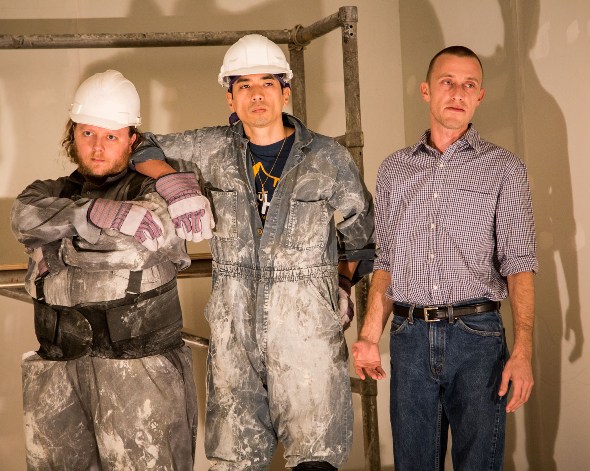
Sullen laborers (Wain Parham, Huy Nguyen) and sorely tested construction foreman Volodya struggle to get along in this existential gem of a play.
Volodya tries to run a collegial workplace, but he also engages in a great deal of introspection when he is not inspecting his sullen laborers’ work, demanding corrections, keeping up with paperwork, dealing with complaints, and, when absolutely pushed to the limit, firing those who have taken him to the breaking point.
The narrow oblong room in which “Radio Culture” is performed is beyond bare bones, with spot-on minimalism by set designer Eleanor Kahn (plasterboard walls, thick plastic curtains and nothing but a scaffold on wheels as the powerfully evocative movable scenery). And this is complemented by Keith Parham’s bare-bulb lighting and the excellent sound design of Jeffrey Levin.
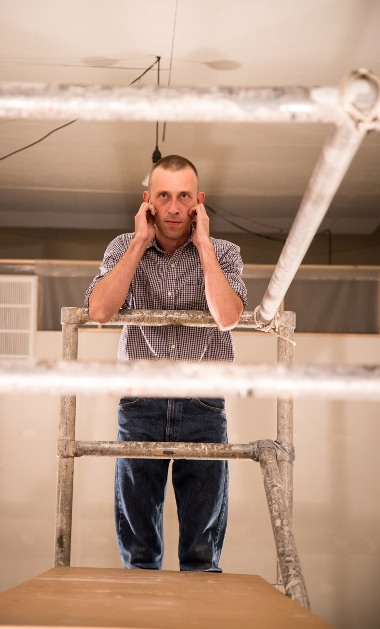
Smith does an astonishing job of capturing Volodya’s painfully resigned (yet hope-against-hope) state of mind.
Maxim Dosko’s impeccable writing is minimalist, too, but just droll, sardonic, detailed and depressive enough to conjure Volodya’s world view, which is told entirely in first person. And Smith, pale, rail thin, and bristlingly smart, does an astonishing job of capturing his character’s alternately agitated, depressed, sanguine, angry, intense, and painfully resigned (yet hope-against-hope) state of mind. This is a tour de force performance of the most impeccable subtlety, marked by a display of deep understanding and meticulous control.
Although Smith is the only actor to speak, the presence of two of his workers – plasterers played by Wain Parham and Huy Nguyen – is of crucial importance. These two men, friends and fellow alcoholics, never utter a word, but their faces and body language say everything about their rage and despair, and make them perfect foils for Volodya.
There are many restraints on life and culture in Belarus these days, with some members of the Belarus Free Theatre (which has produced several of Dosko’s plays) now living in exile in Great Britain. But here is the great irony: “Radio Culture” will easily connect to audiences far beyond that country. It is an existential gem, a perfect evocation of modern life that has been writ small but looms large.
Related Link:
- Performance location, dates and times: Details at TheatreInChicago.com

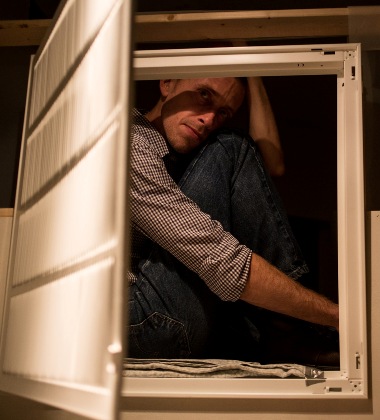

A wonderful actor and script! This captured me completely